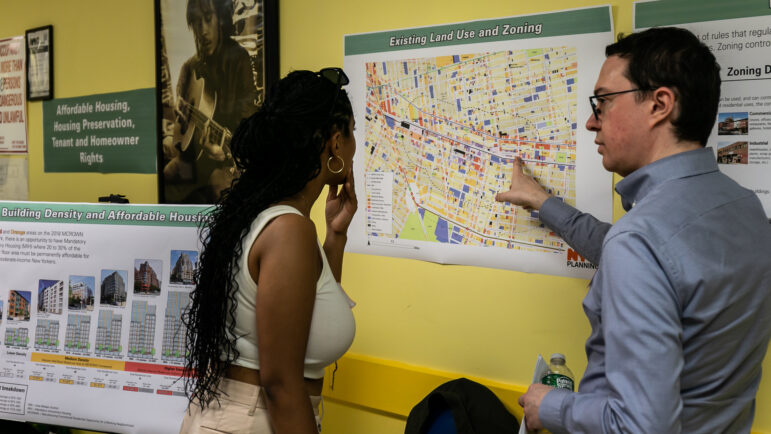
Photo by: Edward Reed, courtesy of City Hall
Mayor Bloomberg discusses the city’s state results, flanked on the left Dennis Walcott — his Deputy Mayor for Education and Community Development — and on the right by Schools Chancellor Joel Klein.
New York City elementary and middle school students scored far worse this year on their annual state math and English exams. It was the first year-to-year decline in at least four years, and reversed a citywide trend of progress on state tests that the Bloomberg administration had attributed to it reforms. The results were announced today by the New York State Education Department and the New York City Department of Education.
New York City’s lower performance likely stems not from a decrease in student ability, but from NYSED’s decision, announced last week, to raise the score required to pass the 2010 test and to permanently recalibrate the entire grading system. To demonstrate proficiency on this year’s math tests, students needed to score 23 to 34 points higher than last year’s passing score of 650. On the English tests, students needed to score 8 to 16 points higher than the 650 bar.
On average, New York City students earned virtually the same points in 2010 as they earned in 2009. But because those points weren’t worth as much anymore, the number of students failing to demonstrate proficiency in English increased about 26 percentage points to about 58 percent; the number failing to demonstrate proficiency in math increased about 29 percentage points to about 46 percent. The increase in failing students was greatest among African-Americans and Latinos, whose failure in English increased about 30 percent and 28 percent respectively and whose failure in math increased about 35 and 32 percent respectively.
In a press release, NYSED Commissioner David Steiner lamented the setback in test scores, which was statewide and affected all racial and ethnic groups, but said raising the passing score was necessary. The new grading system is designed to ensure that the test better predicts student preparation for college. Statewide, across grades 3 through 8 – the grades that take the test – 47 percent of students failed to meet the new proficiency standard in English and 39 percent failed in math, significant increases in failure compared to last year. “New, higher cut scores have resulted in fewer students scoring at a ‘Proficient level’,” said Commissioner Steiner. “While that is sobering news, it should cause all of us – the State Education Department, schools, administrators, teachers, and parents – to work ever more effectively together to ensure that all children in New York State get the knowledge and skills they need.”
Victoria Bousquet, a parent leader with the Coalition for Educational Justice, worries that NYSED’s sudden deflation of student scores will hurt their self-esteem, but said she supports the decision to raise the passing scores and wants NYSED to continue its testing reform. “Now that we’ve realized there’s a defect in our method of evaluating students, we need to figure out another way to evaluate them,” she said. “We have to stop relying on the test alone and on teaching to the test. Let’s overhaul the system.”
Jose Gonzalez, another CEJ parent leader and PTA president at PS 73 in the Bronx, amplified Bousquet’s demands for reform and criticized the city’s Department of Education. “These test results seriously damage the credibility of the DOE and its policies,” Gonzalez said in a press release. “It is a tragedy that at so many schools, the vast majority of the school year is spent drilling students to pass the state test instead of on a diverse, well-rounded curriculum where children explore topics in-depth. And now it turns out these tests haven’t assessed real learning, and this test prep has been a complete waste of time for students, parents, and teachers.”
UFT President Michael Mulgrew issued a statement that also criticized the Department of Education, accusing it of overemphasizing testing : “We’ve never believed that standardized test scores alone are a reliable measure of how schools, teachers or students are doing, nor that preparation for standardized tests is a substitute for real learning. In fact, for years our teachers have been saying that turning their classrooms into test prep academies – as the Department of Education forced them to do – wasn’t really helping children learn. In light of the state’s more rigorous standards, the DOE’s success in raising pupil proficiency has turned out to be illusory.”
At a press conference this afternoon, Mayor Bloomberg and Schools Chancellor Joel Klein said they welcomed the state’s new grading system and said it was consistent with their efforts to raise the bar for student performance in New York City. Bloomberg cited as an example the city’s decision to end social promotion. “I’ve always believed the best way to raise student achievement is to demand higher” performance, Bloomberg said. “We should never underestimate our student’s ability to rise to it.”
Bloomberg and Klein also said the city’s low performance on the 2010 tests doesn’t undermine the progress that students have made under his administration. Klein cited as proof the city’s increasing scores on the National Assessment of Educational Progress, a test many believe provides a more objective measure of student achievement than the state tests. “When we took over the school system, the number of people proficient was lower and we marched those kids way up the ramp,” Klein said. “If you compare apples to apples what you’re going to find out is that New York City from 20O6 until 2010 has made real progress.”








